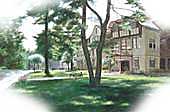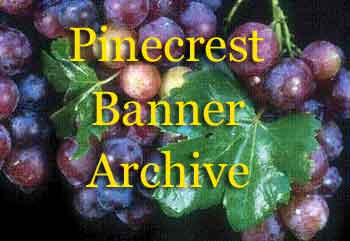Fall
1998
The
Beauty of the Wilderness
Bruce Caisse
Now in the fifteenth year of the reign of Tiberius
Caesar ... Annas and Caiaphas being the high priests,
the word of God came to John the son of Zacharias in
the wilderness. Luke 3:1-2.
As the high priest, Annas and Caiaphas should have received
the word of the Lord in the temple. However, the Lord by-passed
them and He spoke instead to John in the wilderness.
The Lord, unable to find a channel in the Church through
whom He could speak, used the wilderness in which to prepare
a voice to announce the first appearing of the Messiah.
We often think of the wilderness as the place in which we
find ourselves during a time of difficulty; where the "presence"
of the Lord cannot be felt and where the "rain"
of the Holy Spirit does not fall. It is considered to be a
place of barrenness and dryness, both naturally and spiritually.
From time to time, the Lord brings each of us into a wilderness
experience. Therefore, it is important for us to understand
all that the Lord can accomplish within us during our time
in the wilderness. Then, it will become a wonderful place.
The wilderness can be defined in one word - "separation."
Here, in the barrenness of the wilderness, the Lord can deal
with all the ambitions and drives that are within us and separate
us unto Himself.
Once we view the wilderness as a place of separation unto
the Lord, we will realize its great value and purpose. Consider
the children of Israel as they were led out of Egypt through
the Red Sea and into the wilderness. There were different
levels of separation in this journey. The most obvious one
is the Red Sea. The Lord opened the way through the Sea and
as the Israelites reached the other side, the waters closed
upon the Egyptians.
There were no more bricks to be made. Now they were to abide
under the cloud of glory by day, and the pillar of fire by
night. However, they began to murmur. This was to have been
a time of preparation to be made ready to possess the land
that was before them. This is the purpose of the wilderness,
but Israel failed to understand.
"Therefore, behold, I will allure her, and bring her
into the wilderness, and speak comfortably unto her.
And I will give her vineyards from thence, and the
valley of Achor for a door of hope: and she shall
sing there, as in the days of her youth, and as in
the day when she came up out of the land of
Egypt" Hosea 2:14-15.
The Lord is portraying Himself as a husband whose wife has
been unfaithful. She has been distracted by the pull of things
that steal her affections from Jehovah. Yet, the Lord seeks
to restore her and separate her to Himself.
The word "comfortably" means "heart."
The Lord is saying, "I will speak my heart to her."
He removed the distractions by taking her away from Egypt,
which speaks of the pulls of the world, that she might come
to know Him and His voice personally and intimately.
The Song of Solomon speaks prophetically of the Bridegroom,
the Lord Jesus Christ, and of His beloved bride, the Church.
The question is asked,
"Who is this that cometh up from the wilderness,
leaning upon her beloved?" SS 8:5.
This "leaning" speaks of a dependence and trust
that had been developed during a wilderness experience.
The Word of the Lord came to John, rather than to Annas and
Caiaphas, because John responded to the voice of the Lord
alluring him into the wilderness. He left all that he might
be alone with the Lord. John became the voice of the Lord
crying in the wilderness because the Lord was able to speak
His heart to him. "I will allure her and speak my heart
to her."
We do not know how long this took, or all that was required
of John, but he was willing to give himself to the Lord. Jeremiah
2:13 gives us some understanding of why the priesthood did
not hear from the Lord.
"For my people have committed two evils; they have
forsaken
Me, the fountain of living waters, and hewed them out cisterns,
broken cisterns, that can hold no water.
The spiritual leaders of that day were drinking from broken
cisterns. Somewhere, they had forsaken the Lord and had broken
communion with Him. The rain had fallen at one time upon the
house of Israel, and they were still drinking from that cistern
which only spoke of a former day. They were not ready to hear
a "present word" concerning the coming appearing
of the Lamb of God.
We cannot rest in a past visitation or word from the Lord.
There must be a continual listening for a present word from
the Lord. There must be a present receiving from the Fountain
of Living Waters. Only then will we be qualified to minister
the word of the Lord.
As a result of the processing that took place in the wilderness,
John was able to say,
"I am the voice of one crying in the wilderness, Make
straight the way of the Lord, as said the prophet
Esaias" John 1:23.
In hearing the heart cry of the Lord, John found that his
identity had been consumed. He lost himself in the burden
of the Lord. Psalm 69 tells us, "For the zeal of thine
house hath eaten me up." While John was alone in the
wilderness, the spark that quickened him concerning the burden
of the Lord's heart grew until it consumed him and he became
the "voice of one."
The wilderness is not a physical place, rather, it is an
attitude of heart. We can be so content and busy with the
program within the temple that we do not hear His alluring
call into the wilderness.
At this present time, the Lord is looking for a company of
"John the Baptists." He is not looking for ability,
rather He is looking for availability.
If we will respond to His call into the wilderness, each
of us can become a part of this corporate body that is being
prepared to express the Word of the Lord in our day.
Editors note: Bruce Caisse was at Pinecrest from 1979 to
1991. After graduating from the Bible School, he worked in
the print shop, became the men's dorm counselor, and also
taught classes in the Bible School.


